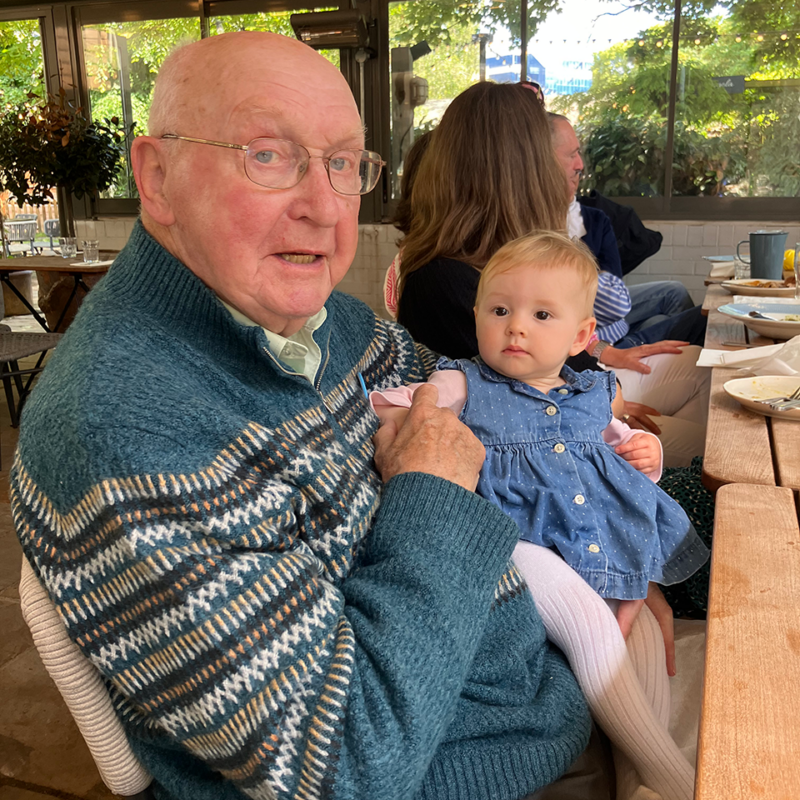
Caring for Dad, from near and afar – Simon’s story
Simon, who has lived in New Zealand for two decades, discusses how he cares for his dad who has Alzheimer’s disease and lives alone in the UK.
Attendance Allowance is a weekly benefit for older adults who have a long-term physical or mental disability that means they need extra help. This often includes people with dementia. It is paid directly to the person with the disability.
To qualify for Attendance Allowance, the person must:
The person does not have to be receiving help to manage their health or care needs already.
‘Help with personal care’ means the person needs assistance with things like washing, dressing, eating and drinking, using the toilet and communicating.
‘Supervision’ means they need someone to watch over them for their own or someone else’s safety, for example when taking medication or crossing roads.
There are two rates of funding, depending on how much care the person needs:
The lower rate is £72.65 per week and is for people who need frequent help or constant supervision during the day OR supervision at night
The higher rate is £108.55 a week and is for people who need help or supervision through the day AND night, or those who are likely to have under 12 months to live (see ‘Special rules’ below)
To apply for Attendance Allowance in England, Scotland or Wales, you will need to fill in the Attendance Allowance claim form.
The form should be posted to Freepost DWP Attendance Allowance – you do not need a stamp or postcode.
You cannot submit the form online.
If you would like a hard copy of the form or an alternative format (eg braille, large print or audio CD), contact the Attendance Allowance helpline on 0800 731 0122.
If you have any technical difficulties with the form, contact the helpdesk on 0800 169 0154 or email dwponline.helpdesk@dwp.gov.uk
You will need to download a different Attendance Allowance application form in Northern Ireland.
It can be handed in at a Jobs and Benefits Office, or posted to:
Attendance Allowance
Disability and Carers Service
Mail Opening Unit
PO Box 42
Limavady
BT49 4AN
For any queries call 0800 587 0912.
Filling in the Attendance Allowance application form can be difficult and time-consuming. It can also be hard to measure how much care the person with dementia needs when you have been helping them for a while and it has become routine.
You may want to ask a family member, friend or carer who is familiar with the person’s needs to help you fill in the form. It is also helpful to have specialist guidance, for example from our dementia specialist Admiral Nurses (see Sources of support, below), Age UK or Citizens Advice.
A relative, carer or friend can complete the form on behalf of the person with dementia, but they must sign it themselves. If they are unable to, a person with lasting power of attorney can sign instead.
If the person does not have lasting power of attorney in place, you can apply to become their ‘deputy’ by filling in a form at gov.uk (there is a fee of £371 for this) or their ‘appointee’ by contacting the Disability Service Centre. This will allow you to sign the form on their behalf.
The main sections of the application form are the ‘Care needs’ sections – one for care needs during the day, and the other for care needs at night.
These cover what help the person needs with:
You will need to answer questions about each of these different areas. Where there is a box for adding additional information, include as much detail as you can about the person’s difficulties.
The section on eating, drinking or cutting up food is one of the most important, which the assessors will focus on. You will need to make it clear if the person with dementia is unable to plan, purchase and prepare food and drink, especially if they are totally dependent on others for these processes.
When filling out the ‘Care needs’ sections:
People who have been told by a medical professional that they are unlikely to live for more than 12 months can apply for Attendance Allowance using ‘special rules’. This can speed up the process so the benefit is paid sooner.
If the person qualifies under special rules, they will be eligible for the higher rate of payment.
As well as the Attendance Allowance application form, you will need to send in a form called SR1, which you can get from the GP, a nurse or a social worker. They will either fill the form out for you or give it to you to fill out.
You should receive a text or letter around three weeks after sending in your form telling you how long it will take to make a decision. You will then receive a letter explaining the outcome and, if the claim was successful, how much the person will receive.
The payments can be backdated to the date you sent in your application, or the date you contacted the helpline to request a form, as long as you submitted it within six weeks.
Attendance Allowance does not have to be spent on care – it is up to you how you spend it.
If your application is turned down, the letter will explain why. If you are unhappy with the decision, you can request a ‘mandatory reconsideration’ within one month of the date on the decision letter.
You can do this by writing to the address on the decision letter, by phone, or by completing a Mandatory Reconsideration Request Form.
If the person lives in Northern Ireland, you can find out about appealing the decision on the Government services website.
It is best to contest the decision by letter or form so there is a written record of the points you have raised. Make a copy so you can re-send it if it goes missing or refer to it later if you need to.
If you do not submit your mandatory reconsideration request within month, you can still apply, but you must have a good reason for the delay, eg a hospital admission or bereavement.
If your mandatory reconsideration is unsuccessful, you can appeal to a tribunal where a judge will look at your case and decide if the decision is fair.
If the circumstances of the person receiving Attendance Allowance change, you must let the Department for Work and Pensions know by calling the helpline.
For example:
Attendance Allowance is not means-tested, which means it is not affected by the person’s income, savings, or any other benefits they receive.
Getting Attendance Allowance could actually mean they are entitled to further benefits, or an increase in some benefits, including Pension Credit, Housing Benefit and Council Tax Reduction.
If you care for someone who receives Attendance Allowance, you may be entitled to Carer’s Allowance.
In this video, Admiral Nurse Lindsay White provides an in-depth look at Attendance Allowance.
It includes a detailed walkthrough of the ‘Care needs’ section of the application form and the kind of information you should include if you are applying for someone with dementia.
To speak to a dementia specialist Admiral Nurse about Attendance allowance or any other aspect of dementia, please call our Helpline on 0800 888 6678 (Monday-Friday 9am-9pm, Saturday and Sunday 9am-5pm, every day except 25th December) or email helpline@dementiauk.org
If you prefer, you can book a phone or video call appointment in our virtual clinic at dementiauk.org/book
Carer’s Allowance and dementia
Mental capacity and decision making
Sources of support: financial and legal
Benefits and financial support if you are disabled or have a health condition
Our free, confidential Dementia Helpline is staffed by our dementia specialist Admiral Nurses who provide information, advice and support with any aspect of dementia.

Simon, who has lived in New Zealand for two decades, discusses how he cares for his dad who has Alzheimer’s disease and lives alone in the UK.

Janet shares her experience caring for husband Ben and how they maintained the joy of Christmas after his diagnosis.

Shara reflects on her journey caring for Anna, her mother, who was diagnosed with vascular dementia in 2016.